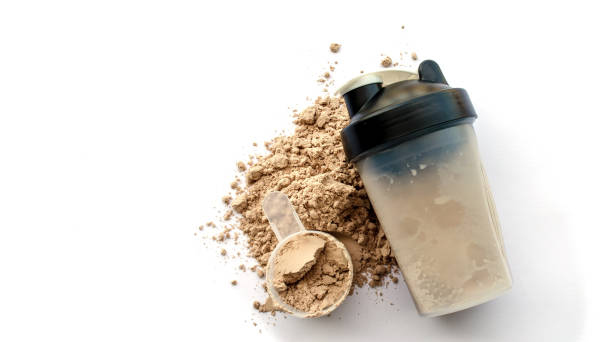Health And Fitness: Whey Protein Benefits and Types
In the whirlwind world of health and fitness, one nutrient has been steadily gaining reputation — whey protein. It’s the buzzword at gyms, the secret sauce among bodybuilders, and the new best friend for those on a wellness journey.
Whey protein, a byproduct of cheese production, has emerged from the shadows of the fitness world to claim its spot in the limelight. Looking at whey protein benefits, the attention is well deserved.
It’s not just for the weightlifters or the aesthetically driven; it’s for anyone seeking a healthful edge. Whether you’re looking to sculpt your physique, manage your weight, or simply enhance your nutritional intake, whey protein has become a go-to.
Its ability to promote muscle repair after exercise makes it a post-workout staple, while its convenience as a powder has foodies blending it into everything from morning smoothies to baked treats.
What is Whey Protein?
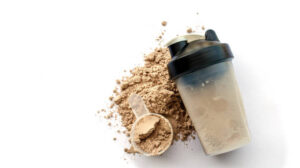
Whey protein is a byproduct of cheese production, the liquid that separates from the curds during the cheesemaking process.
Whey is brimming with all nine essential amino acids required for human dietary needs. It’s highly digestible and swiftly absorbed by the body, making it the champion of the post-workout recovery period.
Types of Whey Protein
Now, not all whey proteins are created equal. They come in three main forms: concentrate, isolate, and hydrolysate, each processed differently to serve distinct nutritional needs and preferences.
Whey Protein Concentrate:
Typically containing the lowest protein content by weight, often retains more of the beneficial nutrients found in whole whey because of minimum processing. It contains low levels of fats and cholesterol but higher levels of carbohydrates. While it remains the most natural form of Whey Protein, it is harder to digest and not favored much due to low protein composition. It may contain anywhere between 40 to 90% protein by composition.
Whey Protein Isolate:
The purest form of protein known is the Whey Protein Isolate. Concentrate of Whey is further processed with the fats and lactose stripped away completely, leaving only protein behind. It is easier to digest than Concentrate but harder than Hydrolysate, being expensive and may result in the loss of some bioactive particles.
Whey Protein Hydrolysate:
Also called hydrolyzed whey, undergoes partial enzymatic digestion, making it the easiest for the body to absorb, and often the go-to for those with sensitive stomachs. It contains the least number of lactose and fats so it is useful for lactose intolerant folks. Often being more expensive than other types.
Gold Standard Whey Protein
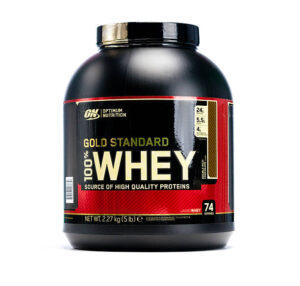
When it comes to sculpting a chiseled physique or bolstering your fitness journey, whey protein often takes center stage. But not just any whey protein; we’re talking about the Gold Standard Whey Protein, a title that’s become synonymous with quality and efficacy in the fitness industry. This iconic supplement has etched its reputation by consistently delivering results that athletes and gym enthusiasts crave.
But what makes Gold Standard Whey the go-to for muscle gain? It’s all in the composition. Packed with essential amino acids, particularly branched-chain amino acids (BCAAs), it fuels muscle synthesis and recovery like no other.
It’s the quality and the rate at which it is absorbed that places it a cut above the rest. The faster absorption means your tired muscles get the nutrients they need without delay post-workout.
Also Check Out: The Benefits of Drinking Water at Night
Best Protein for Muscle Gain?
The answer isn’t one-size-fits-all, but for many, whey protein isolate — often found in Gold Standard products — tops the list. This is due to its high protein content by weight, meaning you’re getting a higher percentage of pure protein with minimal fats and carbs. It’s the purest form of whey, stripped of virtually all lactose, making it a great ally for those with sensitive stomachs as well.
In the bustling market of supplements, the Gold Standard’s prominence is not just because of its name but the trust it has built. It’s like picking a seasoned guide for your mountain trek — reliable and promising the summit. Whether you’re looking to bulk up, lean out, or simply recover better, reaching for that Gold Standard tub might just be the muscle-building handshake your body needs.
But you might ask, why the isolate form? Let us look at it in detail.
Whey Protein Isolate – The Purest Protein
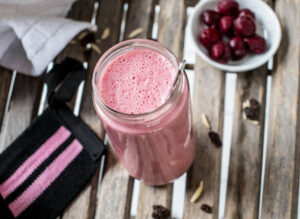
This powerhouse supplement is whey protein in its most refined form, having been meticulously filtered to strip away the majority of lactose, carbs, fat, and cholesterol. What’s left is a product that’s almost entirely pure protein, often boasting a protein content of 90% or higher.
It’s rapidly absorbed, making it the go-to protein punch after workout when your muscles are crying out for nourishment to kickstart the repair and growth process. But the benefits don’t stop at muscle recovery.
For those who are lactose intolerant or looking to keep their calorie intake in check, isolate is a priority. It delivers all the muscle-building goodness without the digestive drama or extra calories that you might find in lower-purity whey protein concentrates.
It’s also a trusted ally in weight loss journeys, it can help keep hunger at bay and preserve lean muscle mass, even in a calorie deficit. So, whether you’re looking to swell in size or slim down in scale, whey protein isolate stands out as a versatile tool.
What Is the Best Whey Protein Brand?

The answer isn’t straightforward, as it depends on individual goals, dietary preferences, and the body’s response to different formulations.
However, a few brands have consistently flexed their muscles at the top of the fitness food chain.
For instance, take ‘Optimum Nutrition.‘ Their Gold Standard Whey has long been the benchmark for purity and taste. What sets it apart is their meticulous attention to protein quality – with each scoop, you’re guaranteed protein sourced from primarily isolate, packed with muscle-making BCAAs.
Then there’s ‘Isopure.‘ Renowned for their crystal-clear whey isolate, they cater to those looking for a low-carb option without any of the lactose or fillers that can upset sensitive stomachs.
But it’s not just about the old guard. Newcomers like ‘Transparent Labs‘ are shaking up the protein powder scene with their 100% grass-fed whey, catering to the clean-eating crowd who want their muscle fuel to be as natural as their philosophy.
Each of these brands has carved out a niche by not only listening to the needs of their customers but by pushing the boundaries of what whey protein can be – whether that’s through taste, texture, or nutritional profile. And in this industry, it’s that innovation and adaptability that keeps a brand not just in business, but at the peak of its game.
Also Check Out: How to Boost Your Immune System with Superfoods Healthy Life
Benefits of Whey Protein
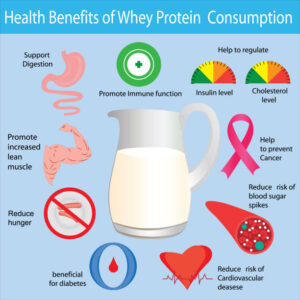
When it comes to boosting your health and achieving fitness goals, whey protein emerges as a star player in the nutritional world. But what benefits does whey have?
Is whey protein good for the body?
Whey Protein Benefits:
- Muscle Building: Whey is packed with essential amino acids, crucial for muscle repair and growth, making it a favorite among athletes and gym enthusiasts.
- Weight Management: High in protein yet low in calories, whey can increase satiety and reduce appetite, helping you manage weight effectively.
- Metabolic Booster: Consuming whey protein can enhance your metabolism, aiding in burning more calories throughout the day.
- Immunity Igniter: Rich in immunoglobulins and lactoferrin, whey protein can bolster your immune system, keeping you in fighting form.
- Recovery Accelerator: The quick absorption rate of whey protein means faster recovery and reduced muscle soreness post-exercise.
- Heart Health Helper: Regular intake of whey protein has been linked to lowering blood pressure and improving vascular functions, contributing to a healthier heart.
- Blood Sugar Balancer: Whey protein can help in moderating blood sugar levels, especially when consumed before or with high-carbohydrate meals.
- Antioxidant Advocate: With its ability to raise levels of cellular antioxidants, whey protein contributes to combating oxidative stress.
Let us discuss the use of Why Protein in our daily lives rather than just conversing about weight gain and body-building.
Is Whey Okay to Drink Everyday?
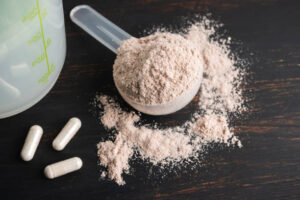
Incorporating whey into your daily routine is as effortless as it is beneficial. A scoop in your morning oats, a dash in your coffee, or even mixed into a savory soup can up the protein ante of your meals. It’s not about chugging down shakes; it’s about enriching your diet with essential building blocks for muscles and enzymes that keep your body humming.
However, like every good thing, moderation is key. While whey is generally safe for daily consumption, it’s crucial to listen to your body and adjust accordingly. Not everyone requires the same protein intake and overdoing it—especially without adequate water intake—can put unnecessary strain on your kidneys.
In essence, whey protein is a stellar addition to any diet, promising not just muscle gain, but also offering the gift of convenience and versatility.
Side Effects of Whey Protein?

Foremost among considerations is the kidney conundrum.
Is whey protein safe for kidneys?
For individuals with healthy kidneys, whey protein does not ring alarm bells. However, for those with pre-existing kidney conditions, the narrative takes a twist. High protein intake can be strenuous on the kidneys, necessitating a more tempered consumption if you’re managing such a condition.
But kidneys aside, let’s not sidestep the broader spectrum of potential side effects. While uncommon, some may experience mild adversity such as bloating, gastrointestinal distress, and at times, an allergic reaction if lactose intolerant or sensitive to dairy. Moderation is key, as is the understanding that more is not always better. A scoop of whey can pave the way to reaching your protein goals, but it should complement a diet diverse in nutrients, not replace it.
And while whey is a titan in the protein pantheon, let’s not don a blindfold to quality. The market is a mosaic of choices, and as I said not all whey is created equal. Artificial sweeteners, fillers, and low-quality ingredients can turn a healthful choice into a Trojan horse. Discerning the worthy from the wanting is your chalice to bear, ensuring that your choice of whey stands tall in quality and purity.
Summary
In a world where wellness trends come and go with the wind, whey protein stands tall and steadfast.
Here’s a summary of the article for your convenience:
- Whey Protein’s Crown Jewels: A complete protein, rich in all nine essential amino acids, it’s the cornerstone of muscle repair and growth, weight management, and metabolic enhancement.
- Convenience Meets Nutrition: Far beyond the gym, it’s the versatile protein boost for your smoothies, oats, or savory dishes, seamlessly integrating into your daily diet.
- Gold Standard: This isn’t just a buzzword; it’s a promise of quality, especially when it talks about whey protein isolate, known for its high protein content and minimal lactose.
- Customized Consumption: The best whey protein brand is the one that fits your unique goals and dietary needs, whether it’s for muscle gain, weight management, or just improving overall health.
- Daily Dosing: Yes, whey is safe to drink every day, but with a note of moderation, ensuring you don’t overburden your kidneys and stay hydrated.
- Side Effects?: Generally safe, whey protein’s side effects are rare but worth noting, especially for those with dairy sensitivities or pre-existing kidney issues.
Conclusion:
My personal thoughts are that while there are many dangerous supplements, namely steroids, there are still many viable and effective products that actually give you benefits and a healthy boost instead of pumping you full of harmful substances.
Even i am convinced after research for this article to try out Whey Protein, just the sheer amount of whey protein benefits is enough to give it a shot. Just have to check if my kidneys aren’t failing.
I hope you learned something and are willing to accept whey protein as a part of your life in your journey into a healthy future.
Continue Reading: How eSports Is Taking Over the World of Sports 2023 Overview

